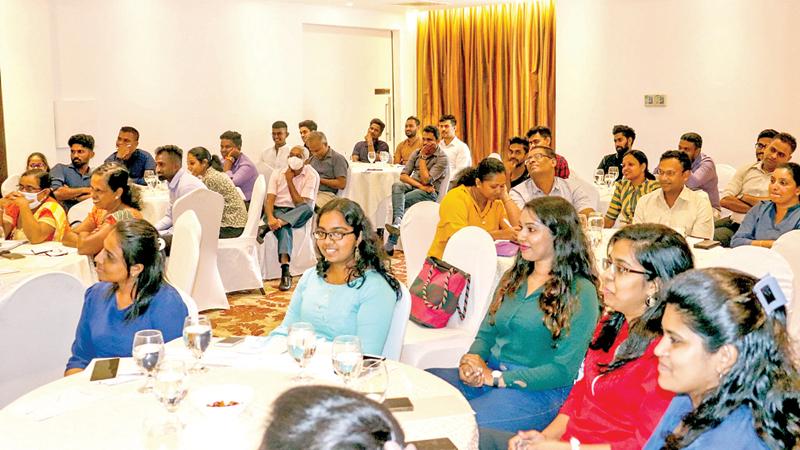
Alcohol and Drug Information Centre (ADIC) conducted an opinion survey on increasing cigarette taxes, covering 15 districts of the country. The study population of 2,653 was selected representing all Divisional Secretariats and the survey was conducted from May 7 to 17, 2023.
According to Program Director Amaranath Tenna, the ADIC opinion survey was conducted to understand the public’s knowledge on the importance of tobacco taxation and indexation; to seek the opinion of the public regarding IMF targets on tobacco tax and indexation; and to understand the level of support from the public for increasing tobacco tax and introducing indexation as tobacco control policies.
 ADIC Program Director Amaranath
Tenna at a workshop.
|
Frequency of collected data from each district.
Distribution of study participants is as follows.
1. If the taxes on goods and services are increased to boost the Government revenue, which of the following would you support increasing taxes on?
Explaining the harm of cigarette use to the Sunday Observer, Amaranath Tenna said that the use of cigarettes is a significant health concern in Sri Lanka. Being a deadly product, tobacco is accountable for over 20,000 preventable deaths per year caused by cancers, heart diseases and respiratory illnesses. Tobacco adds a heavy economic burden on the health sector, resulting from the high costs associated with treatments for tobacco-related diseases.
 According to data from the Global Adult Tobacco (GAT) Survey, 2020, 9.1 percent of the people above 15 years of age were using cigarettes. Around 1,500,000 of the adults in Sri Lanka smoke cigarettes. Around Rs. 400 million of the hard-earned money of Sri Lankans is drained out of the country daily to foreign monopolies, at a time when the country is facing severe economic difficulties. According to Amaranath Tenna, from the total tax revenue, only 7 percent is contributed by tax on cigarettes in Sri Lanka.
According to data from the Global Adult Tobacco (GAT) Survey, 2020, 9.1 percent of the people above 15 years of age were using cigarettes. Around 1,500,000 of the adults in Sri Lanka smoke cigarettes. Around Rs. 400 million of the hard-earned money of Sri Lankans is drained out of the country daily to foreign monopolies, at a time when the country is facing severe economic difficulties. According to Amaranath Tenna, from the total tax revenue, only 7 percent is contributed by tax on cigarettes in Sri Lanka.
Considering excise duty as government revenue is an outdated economic method, and the revenue received from excise duty cannot be regarded solely as government revenue. The gap between the excise duty and the cost borne by the Government due to health, economic and other consequences resulting from tobacco use should be scientifically calculated to determine whether excise duty brings actual revenue to the government.
“For example, a study conducted by the World Health Organization (WHO), the National Authority on Tobacco and Alcohol (NATA) and the Ministry of Health revealed that the tax revenue received from cigarettes in 2015 was Rs. 80,015 million while the health and economic loss incurred on the Government due to cigarette use within the same year was Rs.84,320 million. This situation has gone from bad to worse after 7 years by 2023. “
‘According to the requirements of the IMF agreement, tax reforms need to be implemented as revenue generation measures under several criteria, including the following, such as increasing excise taxes on tobacco products by 20 percent and accordingly the first increase was implemented on January 1, 2023, for tobacco. The second increase is required to be implemented shortly.
Significantly increasing tobacco excise taxes and prices has been identified as the single most effective and cost-effective strategy for reducing tobacco use and associated harm.
Due to several forces acting through the Ministry of Finance, there is a delay in taking measures to establish a rational, scientific tobacco tax policy within the country, which has resulted in lost revenue of around Rs.200 billion within the past five years. Consequently, the majority of the lost revenue has become profits of the British American Tobacco (BAT).
Tenna, explaining the importance of the Tobacco tax and pricing and the current situation in Sri Lanka, said that the World Health Organization (WHO) recommends introducing taxes on tobacco products so that at least 75 percent of the retail price is tax.
“Based on the WHO guidelines, at least 75 percent of the retail price of tobacco products should be tax. But, according to calculations, the total tax per cigarette only amounts to about 66 percent from the retail price. Due to the lack of a rational tax policy, tax on cigarettes is not adjusted to maximum levels. Utilising this as an added advantage, tobacco maintains a large price margin by allocating a price increase on top of the tax increase that benefits the industry, which could have been earned by the government as tax revenue,” he said.
